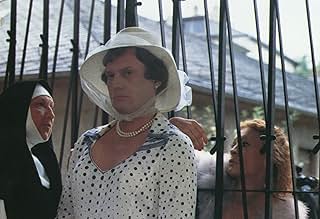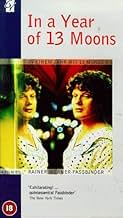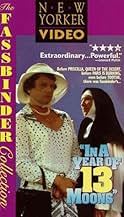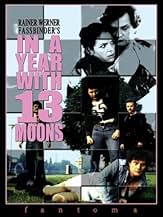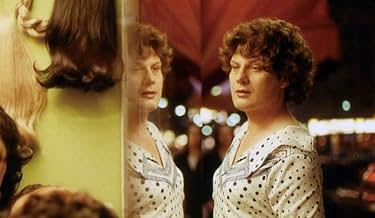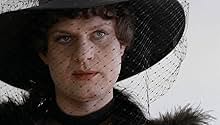VALUTAZIONE IMDb
7,3/10
5039
LA TUA VALUTAZIONE
Una donna transgender cerca di salvare qualcosa dalla sua vita confrontandosi con il suo passato angoscioso, sperando di trovare la massima accettazione tra i suoi conoscenti e se stessa.Una donna transgender cerca di salvare qualcosa dalla sua vita confrontandosi con il suo passato angoscioso, sperando di trovare la massima accettazione tra i suoi conoscenti e se stessa.Una donna transgender cerca di salvare qualcosa dalla sua vita confrontandosi con il suo passato angoscioso, sperando di trovare la massima accettazione tra i suoi conoscenti e se stessa.
- Regia
- Sceneggiatura
- Star
- Premi
- 1 vittoria in totale
Lilo Pempeit
- Schwester Gudrun
- (as Lieselotte Pempeit)
Janez Bermez
- Oskar Pleitgen
- (non citato nei titoli originali)
Rainer Werner Fassbinder
- Self
- (filmato d'archivio)
- (non citato nei titoli originali)
Günther Holzapfel
- Angestellter H. H. Brei
- (non citato nei titoli originali)
Ursula Lillig
- Putzfrau
- (non citato nei titoli originali)
Augusto Pinochet
- Self
- (filmato d'archivio)
- (non citato nei titoli originali)
Recensioni in evidenza
This drama follows the last few days in the life of Elvira (formerly Erwin) Weisshaupt. Years before, Erwin told a co-worker, Anton, that he loved him. "Too bad, you aren't a woman," he replied. Erwin took Anton at his word. Trying to salvage something from the wreckage love has made of his life, he now hopes that Anton will not reject him again.
At this point (2017), I have seen most of what Fassbinder has made. And, indeed, the vast majority is really good. Some have said this is his best work. While I am not sure I am ready to jump on that train, I am also not willing to deny the possibility. Even the content alone deserves praise. This is 1978. I am no expert on transgender history, but I cannot think of any films that tackled such a heavy subject this far back.
If anything, the film seems even more topical today as transgender issues are more front and center. The mainstream is ready to stand up for the rights of these folks, and films like "13 Moons" should really be re-examined by the film community.
At this point (2017), I have seen most of what Fassbinder has made. And, indeed, the vast majority is really good. Some have said this is his best work. While I am not sure I am ready to jump on that train, I am also not willing to deny the possibility. Even the content alone deserves praise. This is 1978. I am no expert on transgender history, but I cannot think of any films that tackled such a heavy subject this far back.
If anything, the film seems even more topical today as transgender issues are more front and center. The mainstream is ready to stand up for the rights of these folks, and films like "13 Moons" should really be re-examined by the film community.
Fassbinder's genius is making you feel as trapped and desperate as Elvira, you really feel empathy for the character. Only the visit with her family is there a brief respite from her pain. Kudos for Fassbinder for his good taste in using Suicide's "Frankie Teardrop" on the soundtrack--a song about a man who feels trapped, but directs his anger outward, rather than inward, like Elvira.
As some others have written or implied this film is absolutely exhausting. It doesn't abandon its character or his life at any time although at times we almost WANT relief. Mahler's music in films has been dutifully noted. It can be almost as depressing in concert version. As for Nino Rota's "happy" music, or "life just continues (joyfully)" score, the irony isn't lost either. This is a one-man job and therefore takes risks that few producers or companies would tolerate under normal circumstances. I was profoundly moved by the film; I just don't plan to see it again for a while.
Curtis Stotlar
Curtis Stotlar
First of all, I would not call this a trans-or LGBT-themed film. Elvira, the main character, may have had trans surgery, but the plot makes it clear that they aren't a trans woman, that they made a mistake having the surgery. But it's also clear that the main character isn't a man, either-they are a person with a lack of identity. So it's a mistake to classify this one with the stories of trans men and women, it's about something very different.
Elvira's lack of identity surfaces in the fact that they can't remember their childhood at all, and when they search for details on it, the results are even more frustratingly ambiguous. They think that loving someone else gives them an identity, and it is this part of falling in love that they love the most-not so much being with another human being, but what it turns them into. That's why they undergo the surgery-because they think it will make them something when they are starting out as nothing. The surgery is just another turn of the screw for them-just another way of groping for an identity that isn't there. It's a much bleaker and more existential story than any trans-themed film I've ever seen.
The film leaves us with more questions than answers, which is how it should be. The characters speak in long monologues that raise lots of questions but no answers. They're more riddles than statements, and it's maddening. Maddening because the more Elvira searches for answers, the more they slip away from them. It's like a horrible taunt for Elvira, and we, in the audience, are not spared one moment of the terrible ambiguity of it all. Fassbinder's compositions add to the confusion, showing us a world that is as unclear to us as it is to Elvira.
For anyone going into this film looking for an LGBT story, you will be disappointed, as you will be if you like a story with a solid resolution. But for those who tolerate ambiguity and frustration-and, indeed, see how they can be virtues in art-you may well be dazzled and hypnotized.
Elvira's lack of identity surfaces in the fact that they can't remember their childhood at all, and when they search for details on it, the results are even more frustratingly ambiguous. They think that loving someone else gives them an identity, and it is this part of falling in love that they love the most-not so much being with another human being, but what it turns them into. That's why they undergo the surgery-because they think it will make them something when they are starting out as nothing. The surgery is just another turn of the screw for them-just another way of groping for an identity that isn't there. It's a much bleaker and more existential story than any trans-themed film I've ever seen.
The film leaves us with more questions than answers, which is how it should be. The characters speak in long monologues that raise lots of questions but no answers. They're more riddles than statements, and it's maddening. Maddening because the more Elvira searches for answers, the more they slip away from them. It's like a horrible taunt for Elvira, and we, in the audience, are not spared one moment of the terrible ambiguity of it all. Fassbinder's compositions add to the confusion, showing us a world that is as unclear to us as it is to Elvira.
For anyone going into this film looking for an LGBT story, you will be disappointed, as you will be if you like a story with a solid resolution. But for those who tolerate ambiguity and frustration-and, indeed, see how they can be virtues in art-you may well be dazzled and hypnotized.
In A Year With 13 Moons was directed rather late in director Werner Rainer Fassbinder's career, and in this film you almost get a whiff of life imitating art as you feel like you're watching the last days of Fassbinder as a director. In this film you can see the influence of films that Fassbinder admired, for example, Le Diable probablement, but In A Year With 13 Moons is bleak and impersonal in a way that the aforementioned film is not. It lacks the aesthetic obsession that French films often have and instead there is an emphasis on showing people and places as they truly are.
There are scenes that take place in darkened rooms where you almost get a contrived, science-fiction feel, and you're reminded that in all fiction the process of "world-building" occurs, but it's less obvious in contemporary drama because the viewer/reader is able to associate the names of places and people in the drama with real places and people, so the contrived nature and world-building are neatly tucked under the rug for no one to see. The film is remarkable in its tale of Elvira/Erwin who breaks up with her lover and then has to meet up with an old acquaintance after a misunderstanding. The actors totally inhabit their roles as they generally do in Fassbinder's films and this certainly is a testament to Fassbinder's brilliance as a director.
The primary weakness of this film is that it lacks naturalness and feels just a little too false, in contrast to, for example, Fassbinder's Fox and His Friends, which feels very natural. In A Year With 13 Moons is artsier, somewhat commedia-dell'arte-esque with its stereotypical characters, but after watching so many bad films recently this particular film felt like a breath of fresh air. A notable scene occurs at a butcher site or mechanical abattoir where cattle are being bled and slaughtered, which again was a little reminiscent of the scenes of environmental degradation in Le Diable probablement. In A Year With 13 Moons is a must-see. 8 out of 10.
There are scenes that take place in darkened rooms where you almost get a contrived, science-fiction feel, and you're reminded that in all fiction the process of "world-building" occurs, but it's less obvious in contemporary drama because the viewer/reader is able to associate the names of places and people in the drama with real places and people, so the contrived nature and world-building are neatly tucked under the rug for no one to see. The film is remarkable in its tale of Elvira/Erwin who breaks up with her lover and then has to meet up with an old acquaintance after a misunderstanding. The actors totally inhabit their roles as they generally do in Fassbinder's films and this certainly is a testament to Fassbinder's brilliance as a director.
The primary weakness of this film is that it lacks naturalness and feels just a little too false, in contrast to, for example, Fassbinder's Fox and His Friends, which feels very natural. In A Year With 13 Moons is artsier, somewhat commedia-dell'arte-esque with its stereotypical characters, but after watching so many bad films recently this particular film felt like a breath of fresh air. A notable scene occurs at a butcher site or mechanical abattoir where cattle are being bled and slaughtered, which again was a little reminiscent of the scenes of environmental degradation in Le Diable probablement. In A Year With 13 Moons is a must-see. 8 out of 10.
Lo sapevi?
- QuizThe tape-recorded narration heard throughout the film (particularly during the final scene) was not scripted. Volker Spengler (playing Elvira Weishaupt) and Rainer Werner Fassbinder recorded the narration together, with Fassbinder asking questions and Spengler responding in character. In the final cut of the film, Fassbinder's voice is edited out.
- Colonne sonoreSchöner fremder Mann
Music and Words by Athena Hosey and Hal Gordon and German lyrics by Camillo Felgen
Performed by Connie Francis
I più visti
Accedi per valutare e creare un elenco di titoli salvati per ottenere consigli personalizzati
- How long is In a Year with 13 Moons?Powered by Alexa
Dettagli
- Data di uscita
- Paese di origine
- Lingua
- Celebre anche come
- Un anno con tredici lune
- Luoghi delle riprese
- Aziende produttrici
- Vedi altri crediti dell’azienda su IMDbPro
Botteghino
- Budget
- 700.000 DEM (previsto)
- Tempo di esecuzione2 ore 4 minuti
- Mix di suoni
- Proporzioni
- 1.66 : 1
Contribuisci a questa pagina
Suggerisci una modifica o aggiungi i contenuti mancanti

Divario superiore
By what name was Un anno con 13 lune (1978) officially released in India in English?
Rispondi
